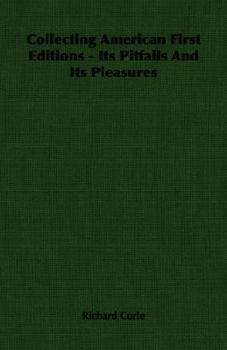Collecting American First Editions - Its Pitfalls and Its Pleasures
Select Format
Select Condition 
Book Overview
This work is concerned primarily with, first principles. Its aim is not to deal with every book of the authors mentioned, but to clear up moot points, to demolish false theories, to present new discoveries, and in general to suggest sound rules for the collecting of American first editions of the classic period. Tentative and imperfect though it be, I trust it will supply a real need, for the subject is full of obscurities and up to now comparatively little effort has been made to light it up from within. And yet it is only by so doing that the chaos can be dissolved and the collector enabled to steer a path through the maze. By describing methods of publication and by bringing ordinary logic to bear, I have at least tried to simplify the problem and to evolve some sort of synthesis. I do not for a moment suppose that the validity of all my ideas will be admitted by everyone. That would be too much to expect. But I hope that my facts, which have been carefully checked by several experts, are correct, though as all knowledge is relative and as there is no such thing as finality in bibliography it would be foolish to be over-optimistic. I am well aware that the fable of Sisyphus is painfully applicable to the man who writes about American first editions. No sooner does he solve a difficulty, as he supposes, than along comes fresh evidence, down rolls the stone, and he has to start all over again. Yet it is only by experimenting that we advance, and only by arousing opposition that we bring about argument. And bibliographical discussions, unlike political ones, do occasionally end in agreement. It comes to this: that if somebody has always to be standing up to be kicked, I am willing, in a good cause, to be the next victim. The real purpose of these pages is to encourage collecting. But that can best be achieved by giving the collector confidence. And therefore I have endeavoured to warn him not alone against the many snares due to the natural intricacy of the books (which, of course, have led to many mistakes about them that are commonly accepted as facts), but against those other snares spread for him by mankind. Needless to say, I do not refer to the honourable craft of book-repairing, to which almost every collector is under a debt. Certainly not. I refer to something quite different the dishonourable craftiness of book-faking, done for the express purpose of deceiving both book-dealer and book-buyer. The rarer American first editions are being tampered with out of all conscience, and unless this be put a stop to they will fall into universal disrepute and people will turn their attention elsewhere. To everybody connected with books this is a matter of grave concern, and there can be only one opinion as to the desirability of stamping out suspicion by stamping out swindling. And the sure way to end swindling is: first, to be able to detect the swindles when you see them and, second, to decline to have anything to do with them when they are detected. In given instances, I admit, one cannot be positively certain, but by working along the lines I have laid down the swindler's position should gradually become more and more untenable.
Format:Paperback
Language:English
ISBN:1406759260
ISBN13:9781406759266
Release Date:March 2007
Publisher:Curle Press
Length:344 Pages
Weight:0.96 lbs.
Dimensions:0.8" x 5.5" x 8.5"
Customer Reviews
0 rating





